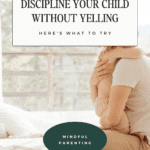
Are you struggling to discipline your child without hitting or yelling?
First, I want to say that you’re not alone in struggling with this and you probably know of many others who deal with trying not to yell at their kids daily. Lots of parents don’t talk about things like this because they feel guilt or shame about yelling at or hitting their kids.
It can be tough, but it’s not impossible to change your behavior toward your children. You can break generational cycles of trauma, but it won’t be an overnight achievement, you’ll be working on this for a while.
The fact that you’re searching for information on how to discipline your child without hitting or yelling is a sign that you deeply love and care for them, and you’re willing to address your own behavior for their benefit.
That. Is. Huge. So, take a deep breath. You’re on the right track.
Let’s dig into some ways that you can use tools like mindful parenting to avoid reacting to your kids’ behavior out of emotion and start reacting to them with logic and compassion.
And let’s talk about some positive discipline techniques you can apply in your own home so that you can stop yelling at your kids as often.
Affiliate Disclosure: Some of the links in this post are affiliate links. This means that if you click on the link and purchase an item, I will receive a commission at no extra cost to you. I only recommend stuff I love and would recommend to a friend.
What is positive parenting and why is it important?
Positive parenting is a term used to describe the act of raising children with positive reinforcement instead of negative reinforcement. It’s based on the idea that children learn best when they’re rewarded for good behavior, rather than punished for bad behavior.
This type of parenting has been shown to be more effective in the long run than traditional methods of discipline, which often rely on punishment.
That’s because positive reinforcement helps children feel good about themselves and their behavior, whereas punishment makes them feel bad about themselves and learn to avoid punishment by concealing behaviors from their parents when they can.
It’s important to note that positive parenting doesn’t mean that you never discipline your child. It simply means that you focus on teaching them the desired behavior, rather than punishing them for the undesired behavior.
The benefits of positive parenting
There’s no manual on how to be a parent, and let’s face it, parenting can be hard.
Positive parenting is based on the notion that every parent-child interaction has the potential to either help or hurt the relationship. Positive parenting has been linked to improved academic performance, increased self-esteem, and even reduced aggression in kids.
So, instead of yelling at your kids or reacting emotionally to their misbehavior, mindful parenting focuses on responding in a way that will build trust and strong emotional bonds.
This doesn’t mean being a pushover – kids still need rules and limits – but it does involve using positive reinforcement rather than punishment when they behave well.
Additionally, positive parenting involves staying attuned to your child’s emotional needs and trying to see the world from their perspective.
Read further: Check out this post I have, The Ultimate Guide to Mindful Parenting for how to get started with mindful parenting along with a lot of resources on the topic.
When you take the time to parent mindfully, you’ll undoubtedly find that it pays off in the long run. Not only will your relationship with your child be stronger,
Tips for positive discipline in the home
Be mindful of your triggers
What sets you off? Is it when your child won’t listen or when they make a mess? Once you know what sets you off, you can start to take steps to avoid those situations.
Stay calm and collected
It’s hard to do, but remember that children are only acting how they see their parents behaving. If you want them to stay calm in difficult situations, you need to model that behavior yourself.
If you have trauma or triggers that make it difficult for you to remain calm in stressful situations with your children, consider
Remember that children are emotionally immature and cannot process most emotional situations in a mature, logical way.
They are not miniature adults, and they need to be treated with patience and understanding. As a result, yelling only exacerbates the situation and makes everyone involved feel worse.
By taking a step back and being more aware of our reactions, we can begin to respond to our children in a more positive, constructive way. With practice, we can learn how to better handle challenging situations without losing our tempers.
And that’s something that everyone in the family can benefit from. (Including yourself – less guilt!)
The power of positive reinforcement
One of the most challenging things about being a parent is learning how to discipline your children in a way that is both effective and respectful. Unfortunately, many parents resort to yelling and violence as a way to control their children’s behavior.
However, this often does more harm than good. Positive reinforcement, on the other hand, is a far more effective approach. By rewarding your children for good behavior, you can encourage them to continue making good choices.
Additionally, by being mindful of your own emotions and reactions, you can model how to effectively deal with difficult situations.
As a result, positive reinforcement is a much better option than violent discipline when it comes to raising happy and healthy kids.
When you hit or yell at your kids, you’re only teaching them how to hit and/or yell at others, including (and especially) their future kids.
Why punishment doesn’t work and what does work instead
It’s no secret that punishment doesn’t generally work when it comes to kids. Timeouts, spankings, and other forms of discipline simply don’t work in the long run.
So how can you stop yelling at your kids and actually get them to behave?
Set limits and be consistent
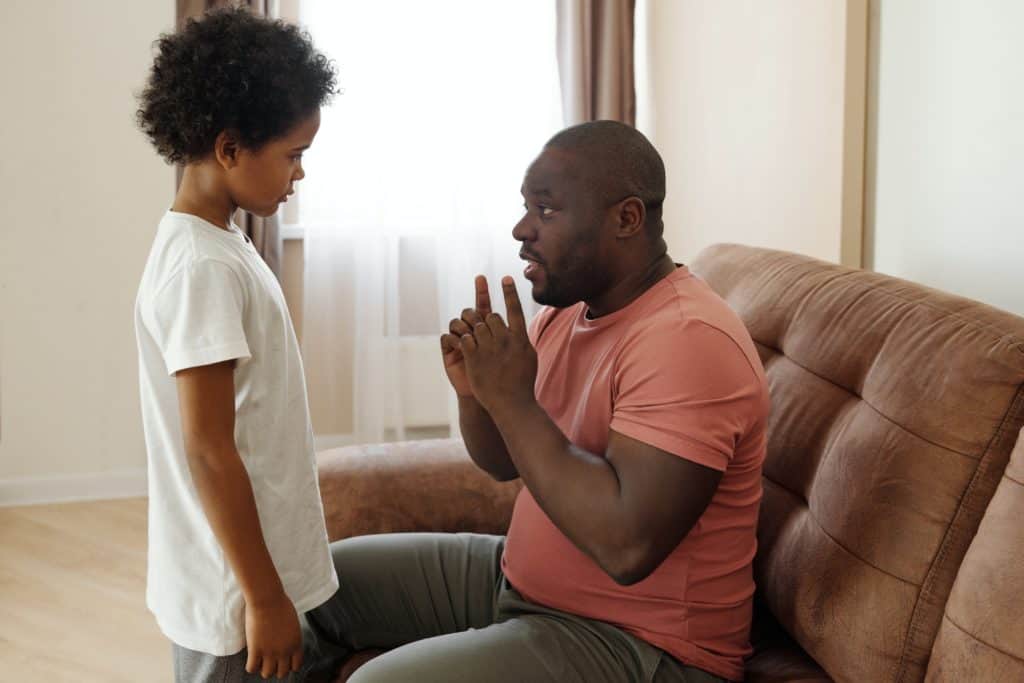 Pin
PinIf you want your children to behave in a certain way, you need to set clear limits and expectations. For example, if you don’t want your child to hit, then you need to make it clear that hitting is not acceptable behavior.
Be consistent in the way you enforce those limits. If you sometimes let your child hit and other times tell them not to, they will be confused and won’t know what is expected of them.
If you want your kids to eat at the table and not on the couch, because vacuuming the living room and the couch 3894 times per day isn’t your idea of a good time and makes you frustrated, tell them that meal times are for the table and
Recognize good behavior
It’s important to recognize good behavior by pointing it out and explaining why it was a good choice on their part. This will help your child understand what you expect from them and encourage them to continue making good choices.
Avoid teaching your children to rely on praise, though, that has negative side effects. From positivediscipline.com: “Praise is not encouraging because it teaches children to become “approval junkies.” They learn to depend on others to evaluate their worth.” Take a look at their article on how to differentiate praise and encouragement when recognizing good behavior.
Avoid too many material rewards, but feel free to use them where you think they’d be applicable. Just don’t rely on them for any and all good behavior reinforcement, because your child may learn to expect a physical reward for everything good they do.
You want to teach your kid to be nice to others because they should treat people how they’d want to be treated. Because hurting people isn’t nice or good or helpful.
You do not want to teach your kid to be nice to others because you’ll take them out for ice cream or give them a sticker if they’re nice.
Create lasting connection with your kids and they’ll cooperate more often without you having to raise your voice
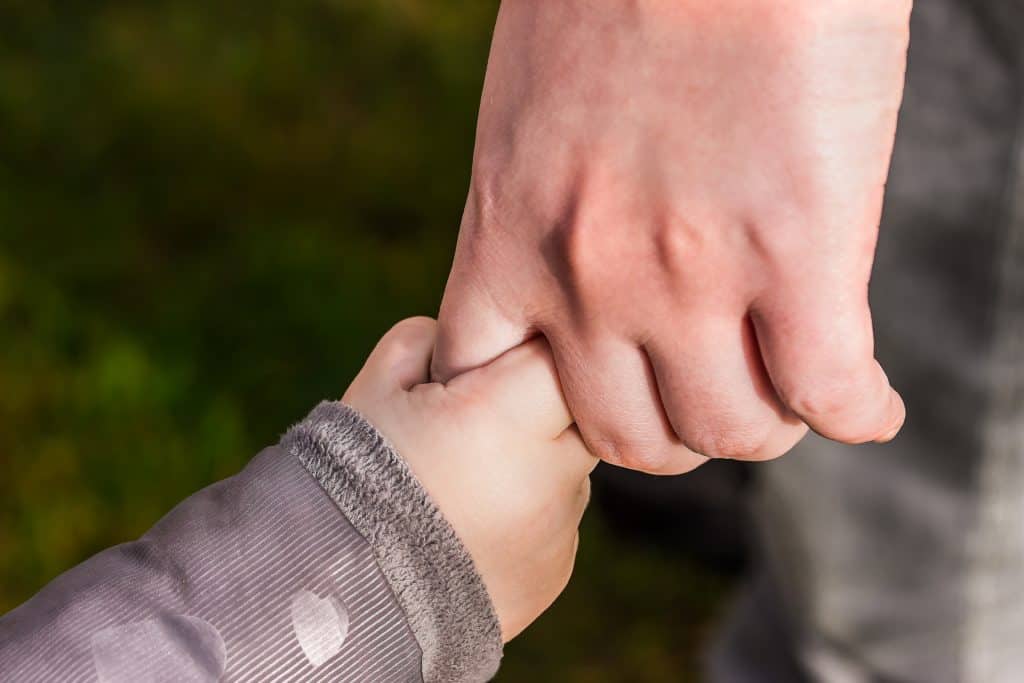 Pin
PinBy being more mindful of your own emotions and reactions, you can learn how to better manage stress and respond to your child in a more positive way.
Additionally, positive parenting techniques such as showing warmth and empathy, setting limits in a respectful way, and offering choices can all help to foster a stronger connection with your child.
When you have a strong relationship with your child, they are more likely to cooperate without you having to raise your voice. Your kids (and your sanity) will thank you for it!
Don’t verbally shame your kids
Be mindful of how you’re speaking to your child. Avoid using threatening, belittling, or derogatory language.
Focus on speaking in a positive and respectful way that explains why a behavior is negative/bad/harmful and why acting differently next time will lead to a better, happier result.
These kinds of phrases should be removed from your family’s vocab and replaced with more helpful phrases:
- “You’re acting like a little baby right now.”
- “Why are you being a brat?”
- “Nothing is wrong with you, calm down.”
- “Your brother didn’t act like this at your age.”
- “You don’t make any sense.”
- “Why don’t you ever listen?”
Model the behavior you expect from your kids
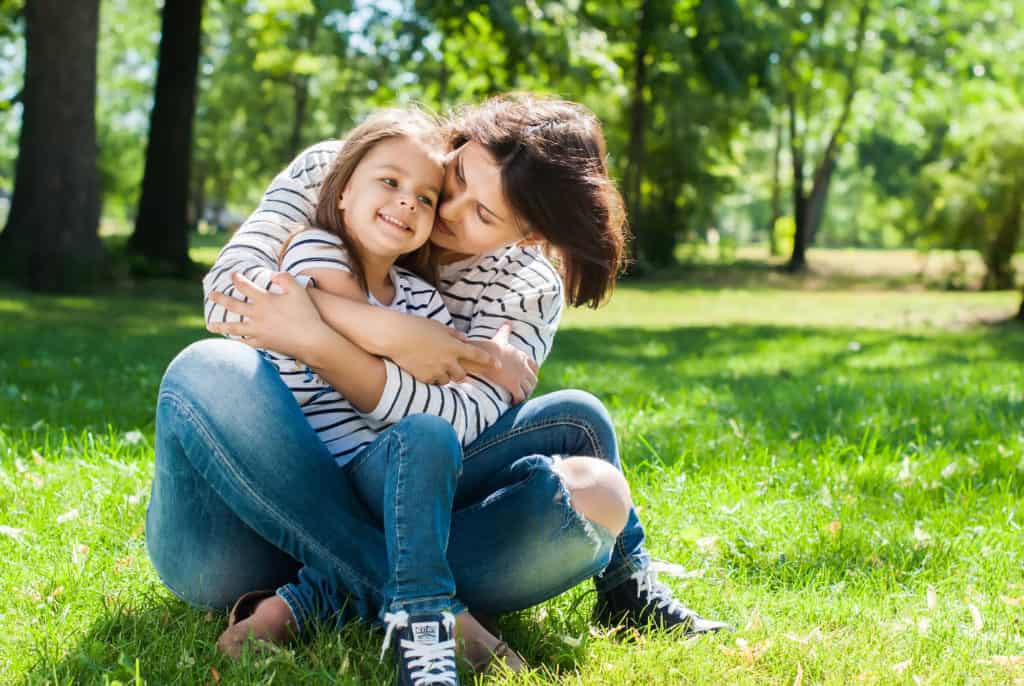 Pin
Pin“Do as I say and not as I do” doesn’t apply here. Kids are like sponges, especially little kids. I’m sure you’ve heard that comparison before because it’s true!
If you yell at them, you’re teaching them how to yell. It really is that simple. Try your best to be kind, empathetic, present, and in tune with your emotions. They will slowly learn to adopt those behaviors.
If your kids are little, walk them through your thought process out loud sometimes when you’re modeling good behavior. Just like speaking out loud to an infant or young toddler often before they start learning to talk, walking your child through a few of the decisions you make throughout the day will help them understand how to make logical decisions not based on emotions or triggers.
For example, say out loud, “I am a little frustrated because of how many dishes are in the sink. I’m going to wash them now to get it over with so that I don’t have to deal with them later, while I’m trying to make dinner.“
Or, “I am a little frustrated because of how many dishes are in the sink. I’m going to take a break for a few minutes to calm myself down and try to do the dishes again later.“
Try something different for time-out
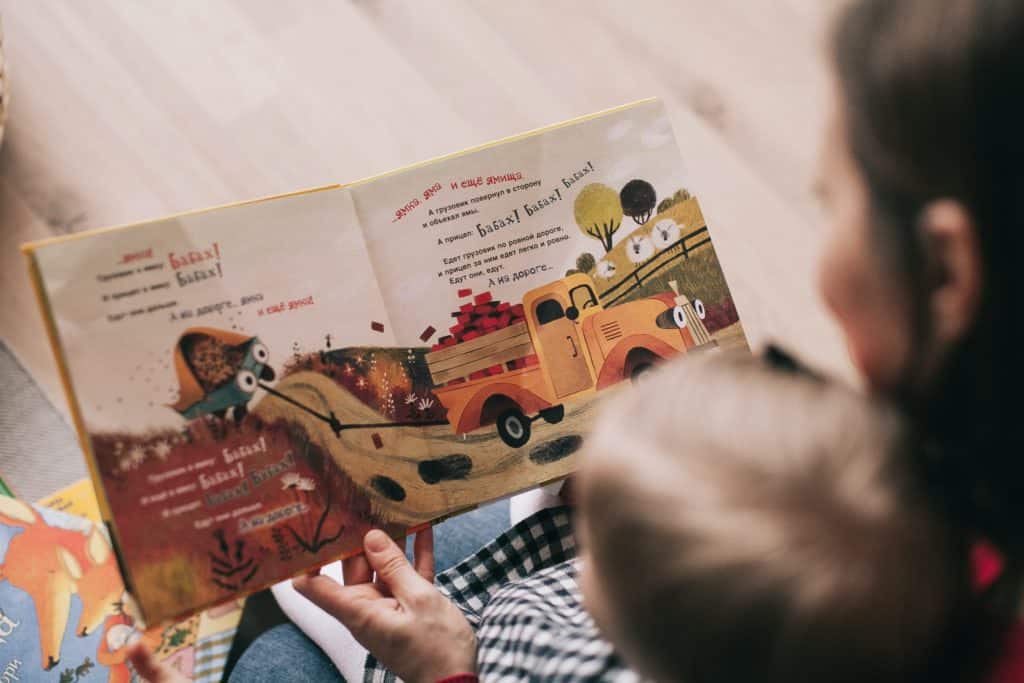 Pin
PinTime-outs aren’t super effective on kids. Sending a 6-year-old to sit and ponder their thoughts about their behavior doesn’t generally lead to them having an epiphany that they should change that behavior.
The Momentous Institute says “…time out can often have the opposite effect than intended. Kids often go to time out without a clear understanding of the reason. Sometimes they feel shame or embarrassment about the incident, sometimes they feel resentful or misunderstood.”
Here are some alternatives to time-outs to explore.
Calm-down corner
With a calm-down corner, you provide your child with a space to go to when they’re feeling overwhelmed or upset. This can be a physical corner in a room, or it can simply be a place in their mind that they can go to when they need to take a break.
The key is to help them understand that this is a place for them to calm down and that they can always come back to it when they need to.
Time-in
A time-in is similar to a time-out, but instead of sending your child away from you, you provide them with some focused attention.
This can be anything from reading together to just sitting and talking. The goal is to help your child feel loved and supported, while still providing some structure and discipline.
Wrapping it up
There are many different ways to effectively discipline your children without resorting to violence or yelling. By being mindful of your own emotions, setting clear limits, and recognizing good behavior, you can create a positive and healthy discipline style that will benefit your whole family.

